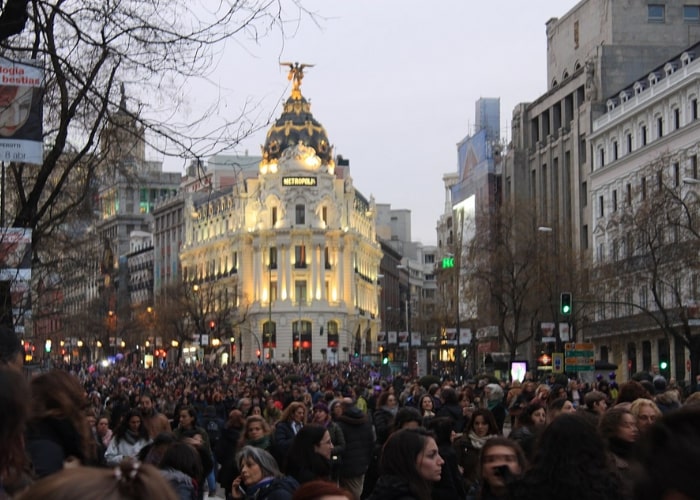MADRID – International Women’s Day is celebrated in many countries around the world. It is a day when women are recognised for their achievements. Above all, without prejudice or regard to divisions, whether national, ethnic, linguistic, cultural, economic, or political.
International Women´s day marches have been cancelled this year due to high numbers of expected turnout in Madrid and elsewhere. Let´s look at the history of International Women´s Day, how important it is in Spain by everyone who lives here.
Sanchez criticised
Last year Prime Minister Pedro Sanchez and many from his government were criticised because they joined in the marches. This, at a time when the dangers of the pandemic were surfacing, and the virus was already circulating throughout Spain. Just days after the marches, Gender Equality Minister Irene Montero tested positive with the virus. Then within a week, the whole country was in strict lockdown. As a result, this year the marches have been cancelled amid concerns that vast numbers expected spread infection rates further. Madrid continues to have the highest rate of infection per 100,000 inhabitants.
Madrid incidence rates still high
According to figures published by the Health Ministry on Thursday, the Coronavirus incidence rate for Spain overall is now 153 per 100,000 inhabitants for the past 14 days. Only Madrid (253), has an incidence rate higher than the ‘extreme risk’ level of 250. The occupation of intensive care wards by Covid-19 patients across Spain overall is 25.44% – but in the Madrid region it is 39%.
International Women´s Day in the early years
Since those early years, International Women’s Day has assumed a new global dimension for women in developed and developing countries alike. The growing international women’s movement, which has been strengthened by four global United Nations women’s conferences. Additionally, it has helped make the commemoration a rallying point to build support for women’s rights and participation in the political and economic arenas.
Officially recognised by the United Nations in 1977, International Women’s Day first emerged from the activities of labour movements at the turn of the twentieth century in North America and across Europe.
Victoria Kent
Malaga born Victoria Kent broke boundaries and barriers with regards to women´s rights. As a teenager, she was sent to Madrid to study Law. She then became affiliated to the Radical Socialist Republican Party. Additionally, she was also the first woman to be called to the bar and the first to argue a case before the Supreme War Tribunal. As such, she was the first woman in the world to practice as a lawyer before a military court. In 1931 Kent had also become one of the first three women to be elected to the Cortes, entering the constituent assembly, charged with writing a constitution for the new Spanish Republic as a Radical Socialist.
Strangely, Kent was against giving women the right to vote. She argued that Spanish women lacked education to be able to vote responsibly. And as such, would be influenced by the Catholic priests. Kent went into exile after the Spanish Civil War and later moved to America. During her time in exile, she took refuge in Paris and helped children. She created safe places and nurseries for those that had been evacuated. At the beginning of the Second World War, Victoria was forced to take refuge in the Mexican Embassy. She had been judged by Franco´s Spanish courts and was to serve 30 years in prison.
In 1977, forty years after going into exile, Victoria returned to Spain. However, she returned to New York. In 1986, she was awarded the medal of the Order of San Raimundo de Peñafort. However, due to her old age, she was unable to attend the event to collect her medal. She died a year later in New York.


